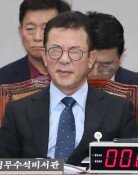U.S. proposes duties on countries that undervalue currency
U.S. proposes duties on countries that undervalue currency
Posted May. 25, 2019 07:42,
Updated May. 25, 2019 07:42
The U.S. Commerce Department has said that it was proposing a new rule to impose additional tariffs on products from countries that artificially undervalue their currencies against the dollar. This is an apparent move to block China from taking detours around higher tariffs, but is also expected to negatively affect other countries. South Korea, in particular, is likely to suffer directly and indirectly amid escalating tensions between the two superpowers.
The U.S. Commerce Department announced Thursday (local time) that it would amend the countervailing duty process to counter countries that devalue their currencies against the dollar, according to Bloomberg and The New York Times. “This change puts foreign exporters on notice that the Department of Commerce can countervail currency subsidies that harm U.S. industries,” Commerce Secretary Wilbur Ross said in a statement.
A countervailing duty is a tax imposed on goods imported at low prices due to foreign governments’ subsidy to weaken their currencies relative to the dollar. Washington appears to be planning to slap a countervailing duty by calculating an amount underpriced due to manipulation. The rule change could generate up to 21 million dollars in additional duties collected each year, if taken to its fullest extent, The New York Times reported.
The South Korean government is reportedly assessing that a possible imposition of the countervailing duty will not have a huge influence on the domestic economy, saying that the exchange rate of the Korean won is determined by markets and thus Seoul is not one of currency manipulators. “We are closely coordinating with the U.S. Treasury Department” said an official from South Korea’s Ministry of Strategy and Finance. “It doesn’t seem to be an issue for South Korea.”
However, Reuters and CNBC reported that the new rule could levy higher tariffs on products from six countries including South Korea, China, Japan, India, Germany, and Switzerland. Since last month, the value of won has plummeted the most among major economies, except for Turkey and other countries that are on the verge of falling into a financial crisis. If the bilateral trade between Washington and Beijing further shrinks due to the new rule, South Korea’s exports of intermediary goods to China will be also affected.
lightee@donga.com · jikim@donga.com
Headline News
- US approves supply of landmines to Ukraine
- Democratic Party moves to impeach prosecutors over non-indictment of first lady
- Record job losses for workers in 40s highlight economic struggles
- Myung suspected of arranging meetings during South Gyeongsang trip
- Guardians’ Stephen Vogt wins AL Manager of the Year






